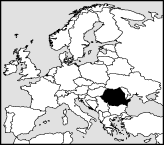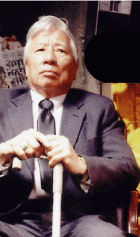ROMANIA
Head of state: Ion
Iliescu
Head of government: Adrian
Năstase
Death penalty: abolitionist for all
crimes
International Criminal Court:
ratified
There were numerous reports of police
torture and ill-treatment. At least seven men died in
suspicious circumstances. Police resorted to firearms in
circumstances which are prohibited by international standards.
Many of the victims were Roma. Excessive restrictions on the
right to freedom of expression remained in spite of a revision
of the Penal Code. Conditions in prisons were sometimes
inhuman and degrading and there were reports of ill-treatment
of detainees.
Background
Romania made slow progress in bringing its national
legislation into line with international human rights
standards. In May a Committee of the Council of Europe
recommended that dialogue with Romania on its fulfilment of
commitments to the organization should be concluded, after the
government informed the Committee that it had fulfilled all
outstanding concerns, including amending certain provisions of
the Penal Code. In fact, the government amended the Penal Code
by adopting an emergency ordinance a week after the Committee
meeting. Even then, this long delayed revision did not abolish
all excessive restrictions on the right to freedom of
expression in line with the European Convention on Human
Rights. In October President Ion Iliescu returned the
amendments to Parliament.
In June Parliament
established a committee to draft proposals for constitutional
reform which would strengthen the functioning of state
institutions. Areas requiring improvement included excessive
legislation by ordinance, and inadequate safeguards to ensure
the independence of the judiciary from government
influence.
In August the government appointed a board
of directors for the Council for Combating Discrimination,
none of whom came from vulnerable minority groups or
non-governmental organizations.
Romania succumbed to
pressure from the USA to sign an agreement not to surrender or
transfer US citizens to the International Criminal
Court.
Torture and ill-treatment
The
number of reported incidents of police beatings, some of which
amounted to torture, remained high. At least seven men died in
custody in suspicious circumstances.
In most cases
victims were beaten and ill-treated by police officers who
wanted to extract "confessions". If they failed to obtain a
"confession", police officers frequently attempted to justify
the use of force by charging the victims with assault or
defamation. In a number of cases victims were not provided
with adequate medical assistance or protected from beatings by
other detainees.
- In March, 32-year-old Mihai Iorga was arrested to serve
a prison sentence because he had not paid a fine. He was
taken into the Ploieşti police lock-up and placed in a cell
where he was beaten by another detainee, reportedly at the
instigation of police officers. The following day he was
taken to a hospital for treatment, then placed in a
different cell where he was again beaten. The officers on
duty then reportedly took Mihai Iorga out of the cell and
beat him further. He went into a coma and died four days
later in hospital. The police authorities initially stated
that Mihai Iorga died because of an "alcoholic coma", then
that he had been beaten by other detainees. The Military
Prosecutor of Ploieşti completed a preliminary investigation
against the police officers and medical staff of the police
lock-up in the unusually short time of two weeks. He decided
that there were no grounds to initiate a criminal
investigation against any of the suspected police
officers.
There were reports that minors were
ill-treated, usually while being questioned at a police
station without their parents or representatives of a child
welfare agency present. Charges against suspected officers
were brought only in exceptional cases.
- In June an officer from Hidiş municipality was charged
with ill-treating 13-year-old F.P. in July 2001. The boy,
who was suspected of petty theft, was taken by two officers
to the police station where he was reportedly stripped naked
and handcuffed with his hands behind his knees. He was then
allegedly suspended from an iron bar between two tables and
beaten with a truncheon. The officer had previously been
convicted of "abusive conduct" and fined in connection with
an earlier case.
In October the European Commission
in its annual report on Romania's progress towards accession
to the European Union stated that "there has been no
noticeable reduction in cases of excessive violence being used
by police officers (in particular against the Roma
community)". The Commission also noted that "successful
prosecutions against police officers are rare and internal
police investigations have frequently been inconclusive". The
Commission urged the government to make public the report of
the European Committee for the Prevention of Torture and
Inhuman or Degrading Treatment or Punishment (CPT) on its
visit to Romania in 1999, which assessed how far CPT
recommendations to prevent torture and ill-treatment had been
implemented.
The RomaMany of the victims
of torture and ill-treatment were of Romani ethnic background.
Police ill-treatment was frequently accompanied by verbal
racist abuse. Although such incidents were numerous, few
official complaints were lodged. In one reported case, the
mother of a 14-year-old boy who was beaten by two gendarmes
did not file a complaint after a local official arranged to
have her fine cancelled. She was fined for disturbing the
peace after she shouted at the gendarmes to stop beating her
son.
- In April, Nelu Bălăşoiu, who was 18 years old,
17-year-old D.D. and 15-year-old M.C. were arrested in Tîrgu
Cărbuneşti. The three Romani youths were reportedly
apprehended with a stolen car tyre and beaten repeatedly by
officers in the police lock-up. On 14 May they were
transferred to Târgu Jiu prison. Men detained in the same
cell as Nelu Bălăşoiu told representatives of APADOR-CH (the
Romanian Helsinki Committee) that he had swellings on his
legs and head and had vomited and passed blood. Apparently
he was seen by a member of the prison medical staff on 28
and 29 May but was only sent to hospital on 3 June. He was
referred on to the Jilava Penitentiary Hospital, where he
died on 5 June. An investigation was reportedly started into
his death and the allegations of torture of D.D. and
M.C.
In April the European Commission against Racism
and Intolerance (ECRI) made public its second report on
Romania and expressed concern about persistent and widespread
problems "as regards police attitudes and behaviour towards
members of the Roma/Gypsy community". ECRI urged the
authorities to review the functioning of the judicial system
in order to ascertain the extent of discrimination in the
administration of justice. It also recommended implementation
of further measures to combat discriminatory practices on the
part of the police. ECRI appealed for the setting up of an
independent investigatory mechanism to look into reports of
police abuses, with power to take action where
appropriate.
Unlawful use of firearms by the
policeAt least three people were shot dead and
several others were injured by police officers in
circumstances which breached international human rights
standards. A new law on the organization and functioning of
the police which came into force in May failed to revise
provisions which allow police officers to shoot at suspects
avoiding arrest who are not posing a threat to life. No
official statistics were available on the number of incidents
in which police officers resorted to firearms and there was no
information about investigations into cases which resulted in
death or injury. In only one case was the perpetrator
convicted. In February the Supreme Court of Romania sentenced
Sergeant Major Ion Nicolae to 18 months' imprisonment for
killing Tudor Palcu in May 1996. However, the same court
failed to complete the trial, begun in March 2000, of an
officer charged with killing Andrei Frumuşanu and Aurica
Crăiniceanu in September 1991.
Freedom of
expressionThe revision of the Penal Code failed to
amend the provisions of two articles of the Penal Code which
placed excessive restrictions on the right to freedom of
expression: Article 168 "Communication of false news" and
Article 236 "Defamation of a state or nation".
- Ovidiu Cristian Iane was detained for three days in
January under Article 168. Together with Mugur Ciuvica, he
was subsequently placed under investigation for distributing
via the Internet a report entitled Armageddon II, which
alleged that the Prime Minister was involved in corrupt
business affairs.
The revised Penal Code maintained
imprisonment as a punishment for insult, libel and defamation
of a public official, under Articles 205, 206 and 239.
According to the non-governmental organization Media
Monitoring Agency "Academia Catavencu", there were more than
400 cases pending against journalists who had written
critically of public figures or local authorities. Most
involved charges of insult or libel.
Some journalists
were subjected to harassment and intimidation. In one case a
journalist who wrote about the illicit dealings of a
businessman supported by the ruling Social Democratic Party
was threatened with blackmail and subsequently a videotape
embarrassing to the journalist was broadcast by a Bucharest
television station.
Other restrictions on the right to
freedom of expression were imposed by economic pressure
exerted at a regional level where local politicians controlled
or were closely linked to the locally based
media.
Prison conditionsOvercrowding,
poor living conditions, lack of activities and inadequate
medical services were reported from many prisons.
In
June, Ploieşti remand prison held 1,136 detainees in 760 beds,
although the official capacity was 574. The overcrowding was
particularly bad in the ward for minors and repeat offenders
where, on average, two to three detainees shared a bed. At
least one incident of prison guards beating minors was
reported.
In July, in Târgu Jiu prison, there were
1,251 people accommodated in 892 beds with 500 beds as the
registered capacity. Heat and lack of air was exacerbated
because the windows were covered with panels in some of the
rooms.
In October, in Codlea prison there were 1,291
men although its official capacity was 640. Prisoners held in
solitary confinement were denied the right to read and their
mattress and sheets were taken out of the cell from 6am to
10pm.
© Copyright Amnesty International





